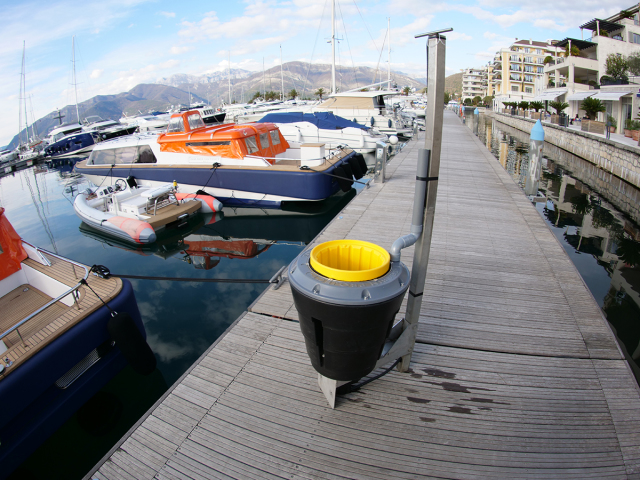Seabin, a new kind of floating bin

Two Australians, surfer Andrew Turton and engineer Pete Ceglinski, designed and developed this new device for combating plastic waste in the marine environment.
A waste trap
At a price of € 3,300 per unit, this small sea bin measuring fifty centimetres in diameter is fitted with an electric pump that can be fitted on a pontoon in a marina, a port or lake. When immersed in a zone in which waste that is difficult to reach for the maintenance services and clean-up boats accumulates, it will capture and suck up floating waste and debris thanks to the continuous current created by the pump. The waste is then trapped in a bag and the water is filtered and discharged into the harbour. A Seabin can collect up to 3.9 kilos of waste per day, averaging around 1 tonne of marine waste per year. Once the bag is full, it can be removed, emptied and placed back in the device. Fish are not at risk as they will not approach the area affected by the current created by the pump.
“Help to clean up our oceans, one marina at a time”
Obviously, the Seabin is not intended to collect large objects and only captures floating waste and debris on the water’s surface. “Nevertheless, it can collect plastic bags, bottles, paper and even natural debris. An oil/water separator can also be installed in the system in order to filter the water”, said one of the two founders. According to an analysis of the first six seabins currently operating in France, 29% of the waste collected comprised cigarette butts, 28% comprised plastic waste, and 26% comprised food packaging.
Launched in 2014, the Seabin Project came to fruition following a successful crowdfunding initiative which enabled its creators to collect 230,000 dollars. Following a partnership with Poralu Marine, a French company responsible for the Seabin’s industrial and commercial development, the number of Seabins operating in harbours and marinas has increased. In 2018, they collected 1.7 tonnes of marine waste. In 2019, its creators hope to be able to trap 7.8 tonnes of waste across around 2,000 seabins immersed in the water. In the long run, one of the Seabin Project’s objectives is to produce the collectors using plastic waste recovered by the Seabins.
More information:
https://www.seabinproject.com/





